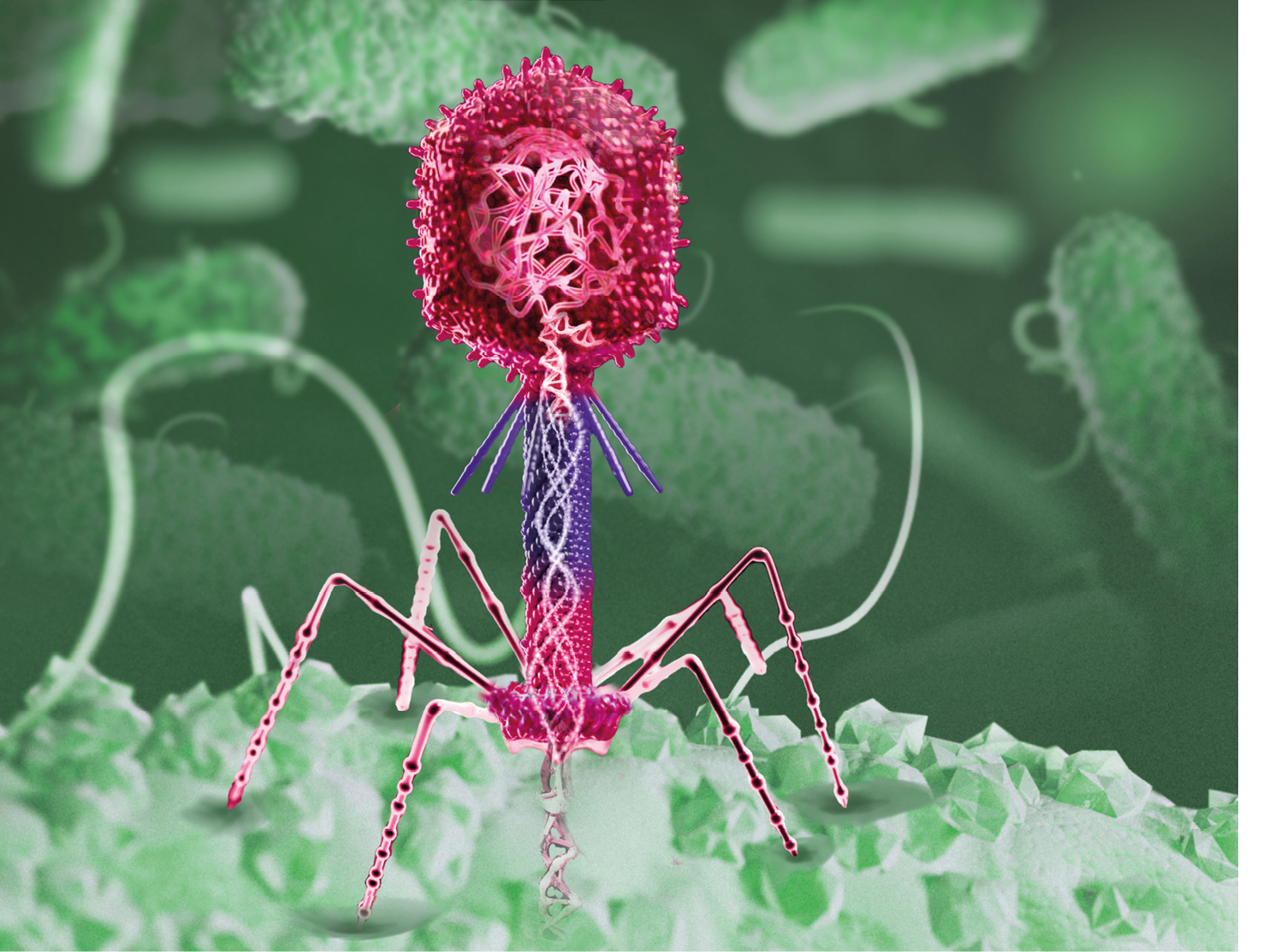Bacteriophages: viruses to be used as therapeutic agents for infections caused by bacteria that are multiresistant to antimicrobials
Main Article Content
Abstract
One of the worst crises in the field of human health is the current inadequacy of many antibiotics to cure bacterial diseases caused by multidrug-resistant strains. It is estimated that around 700,000 people die each year from this cause and that the figure will rise to 10 million per year by 2050. Moreover, in the last 20 years the Food and Drug Administration has only authorized two new antibiotics, which is insufficient to combat the growing bacterial resistance.
Against this dark backdrop, the study of bacteriophages (phages for short) has been intensifying worldwide, seeking findings that will lead to the approval of so-called phage therapy. This is based on the ability of countless phages to replicate in their respective "target" bacteria and cause their inexorable destruction.
Phage therapy has shown better qualities than antibiotics: it would not cause side effects and would not affect the human microbiota, among several other benefits.
The present work describes the main characteristics of bacteriophages and points out the main observations of scientific works, which will update teachers and students in general, but especially those of the Pharmaceutical Biological Chemistry and Food Chemistry careers, on the subject.
Article Details
Citas en Dimensions Service
References
Abedon, S.T. (2017). Information phage therapy research should report, Pharmaceuticals, 10(2): 43. https://doi.org/10.3390/ph10020043
Cesta, N., Pini, M., Mulas, T., Materazzi, A., Ippolito, E., Wagemans, J., Kutateladze, M., Fontana, C., Sarmati, L., Tavanti, A., Lavigne, R., Andreoni, M., & Di Luca, M. (2023). Application of phage therapy in a case of a chronic hip-prosthetic joint infection due to Pseudomonas aeruginosa: an Italian real-life experience and in vitro analysis. Open Forum Infect Dis, 10(2):ofad051. https://doi.org/10.1093/ofid/ofad051
Dedrick, R.M., Smith, B.E., Cristinziano, M., Freeman, K.G., Jacobs-Sera, D., Belessis, Y., Brown, A.W., Cohen, K.A., Davidson R.M., van Duin, D., Gainey, A., Berastegui-Garcia, C., George C.R.R., Haidar, G., Winnie, L.P., Iredell, J., Khatami, A., Little, J.S., Malmivaara, K., McMullan, B.J., Michalik, D.E., Moscatelli, A., Nick, J.A., Tupayachi Ortiz, M.G., Polenakovik, H.M., Robinson, P.D., Skurnick, M., Salomon, D.A., Soothill, J., Spencer, H., Wark, P., Worth, A., Schooley, R.T., Benson, C.A., & Hatfull, G.F. (2023). Phage therapy of Mycobacterium infections: compassionate use of phages in 20 patients with drug-resistant mycobacterial disease. Clin Infect Dis, 76(1): 103-112. https//doi.org/10.1093/cid/ciac453
Duan, Y., Young, R. y Schnabl, B. (2022): Bacteriophages and their potential for treatment of gastrointestinal diseases. Nature reviews. Gastroenterology & hepatology, 19(2): 135–144. https://doi.org/10.1038/s41575-021-00536-z
Fernández, L., Gutiérrez, D., Rodríguez, A., & García, P. (2020). Los bacteriófagos: los virus que combaten infecciones, Madrid, España: CSIC.
Autores (2013). La importancia clínica actual de Staphylococcus aureus en el ambiente intrahospitalario, Educación Química, 24(1): 8-13.
Górski, A., Miedzibrodski, R., Wegrzyn, G., Jonczyk-Matysiak, E., Borysowski, J., & Weber-Dabrowska, B. (2020): Phage therapy: Current status and perspectives, Med Res Rev, 40:459-463. https://doi.org/10.1002/med.21593
Harada, L. K., Silva, E. C., Campos, W. F., Del Fiol, F. S., Vila, M., Dąbrowska, K., Krylov, V. N. y Balcão, V. M.: Biotechnological applications of bacteriophages (2018): State of the art. Microbiological research, 212-213: 38–58. https://doi.org/10.1016/j.micres.2018.04.007
Henkin, T.M., & Peters, J.E. (2020). Snyder and Champness Molecular Genetics of Bacteria. Washington, D.C., USA: ASM Press & John Wiley & Sons, 264-319.
Hitchcock, N.M., Gomez Nunes, D.D., Shiach, J., Saraiva Hodel, K.V., Viana Barbosa, J.D., Pereira Rodrigues, L.A., Coler, B.S., Pereira Soares M.B., & Badaró R. (2023). Current clinical landscape and global potential of bacteriophage therapy, Viruses, 15(4): 1020. https://doi.org/10.3390/v15041020
Jakobsen, R. R., Trinh, J. T., Bomholtz, L., Brok-Lauridsen, S. K., Sulakvelidze, A. & Nielsen, D. S. (2022). Bacteriophage cocktail significantly reduces Listeria monocytogenes without deleterious impact on the commensal gut microbiota under simulated gastrointestinal conditions. Viruses, 14(2): 190. https://doi.org/10.3390/v14020190
Jin, Y., Li, W., Zhang, H., Ba, X., Li, Z. & Zhou, J. (2023). The Post-Antibiotic Era: a new dawn for bacteriophages, Biology, 12(5): 681. https://doi.org/10.3390/biology12050681
Ling, H.; Lou, X.; Luo, Q.; He, Z.; Sun, M y Sun, J. (2022). Recent advances in bacteriophage-based therapeutics: Insight into the post-antibiotic era. Acta Pharmaceutica Sinica B. https://doi.org/10.1016/j.apsb.2022.05.007
Rahimi-Midani, A., Lee, S. W. y Choi, T. J.: Potential solutions using bacteriophages against antimicrobial resistant bacteria. Antibiotics, 2021; 10(12): 1496. https://doi.org/10.3390/antibiotics10121496
Romero-Calle, D., Guimarães Benevides, R., Góes-Neto, A. y Billington, C. (2021). Bacteriophages as alternatives to antibiotics in clinical care. Antibiotics, 8(3): 138. https://doi.org/10.3390/antibiotics8030138
Teklemariam, A.D., Al-Hindi, R.R., Qadri, I., Alharbi, M.G., Ramadan, W.S., Ayubu, J., Al-Hejin, A.M., Hakim, R.F., Hakim, F.F., Hakim, R.F., Alseraihi, L.I., Alamri, T., & Harakeh, S. (2023). The battle between bacteria and bacteriophages: a conundrum to their immune system. Antibiotics, 12(2): 381. https://doi.org/10.3390/antibiotics12020381
Venhorst, J., van der Vossen, J.M.B.M., & Agamennone, V. (2022). Battling enteropathogenic clostridia: phage therapy for Clostridioides difficile and Clostridium perfringens, Front Microbiol, 13: 891790. https://doi.org:10.3389/fmicb.2022.891790
Wilson, B.A., Winkler, M.E., & Ho, B.T. (2019). Bacterial pathogenesis. A molecular approach. Washington, D.C., USA: American Society for Microbiology (ASM) Press, 295-330; 437-473.

Educación Química por Universidad Nacional Autónoma de México se distribuye bajo una Licencia Creative Commons Atribución-NoComercial-SinDerivar 4.0 Internacional.
Basada en una obra en http://www.revistas.unam.mx/index.php/req.




